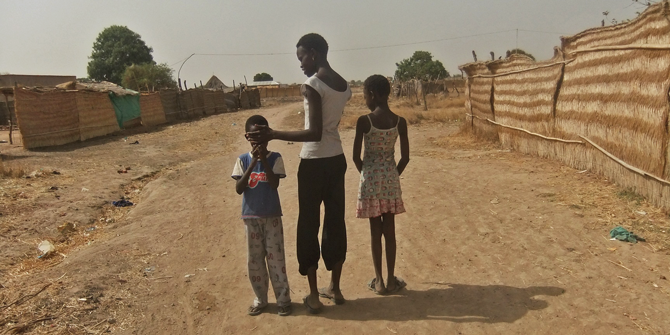
Between 2010 and 2015 several thousand asylum seekers repatriated from Israel back to East Africa. Some returned with the help of NGOs, who claimed to only assist with repatriation that was entirely voluntary and informed. To see if this was true, and to learn about conditions after return, Mollie Gerver interviewed 154 individuals in South Sudan, Ethiopia, and Uganda. During the course of her research, she experienced an ethical dilemma, which she discussed in a recent article in the journal Ethical Theory and Moral Practice.
The Dilemma
In 2012 a woman named Julie was living in Wau, South Sudan. She described to me how she fled her home village as a young girl during the Second Sudanese Civil War in the 1980s. As a child, she made her way to Egypt, but faced police brutality growing up, so in 2007 she paid smugglers to help her cross the border into Israel. Once in Tel Aviv, she married, gave birth to two children, and worked, but struggled to gain any legal status, and feared being detained. So in 2011 she considered returning to South Sudan, and approached an NGO for help. She sat down in their small office, and a staff member interviewed her. She recalls that, during this interview, the staff member said South Sudan had security and free healthcare. After return, she found neither. Of my sample of 134 subjects, 51% similarly recall being misinformed in interviews, and 20% were displaced within two years, three dying of malaria, and five killed in ethnic-targeted killings.
In 2013 I asked the director of the NGO if I could look at transcripts from the interviews. This would help confirm how many refugees had returned due to misinformation or coercion, such as fear of detention by the Israeli government. The NGO told me to first ask permission from those who returned. When I tried calling Julie and many other former refugees, they did not answer their phones, possibly because they were displaced or killed that year, contrary to what the NGO has promised. Paradoxically, the reason they could not consent to me looking at their data, meant to determine if they gave informed consent for repatriation, was possibly because they repatriated without giving their informed consent. In such a case, would it be ethical for me to look at their data?
Resolving the Dilemma
To answer this question, I first considered what former refugees might tell me, were I able to ask them. I reasoned that, if refugees were definitely misinformed or coerced into repatriating, they would likely consent to disclosing their data, to hold the NGO accountable. But I had no way of confirming that refugees were misinformed and coerced, until I looked at their data. More importantly, many may still wish to keep their full interview transcripts private, especially if it includes information of a very private nature, such as their medical history and sexual orientation.
Rather than considering what individuals would prefer, we can instead consider whether they had “object-given reasons” to disclose their data. In philosophy, object-give reasons are derived from facts about the world, rather than subjective preferences alone. To take an example from Derek Parfit, imagine that you come upon a poisonous snake. You falsely believe running away will save you. In reality, you should stand still, because the snake only attacks moving targets. As such, you have a good reason to stand perfectly still, derived from the objective fact that this will save you. You simply do not know you have this reason, because you believe running is safer.
Before refugees returned, some likely had object-given reasons to make their data available to researchers. If NGOs know that researchers will later look at these transcripts, this might encourage them to give accurate information to refugees. For this reason, refugees should be specifically asked – before they repatriate – if they want their data disclosed to researchers.
However, this approach is unhelpful for making a decision now. Julie has no object-given reasons to disclose data, because it is too late for her to make an informed decision. She has already returned, and there is no going back in time, receiving better information, and choosing to stay in Israel. Even if future refugees will benefit, because NGOs will start providing more accurate information, this will not help the particular individuals whose data we are looking at.
But there is another type of object-given reason. Some reasons are derived from moral principles. Imagine that the snake bites you and I happen to be walking by, holding an antidote that can save your life. I have a strong moral reason to give you the antidote, as I can do so fairly easily, at great benefit to you. It seems I have this object-given reason regardless of whether someone asks me if I do, and I have this reason even if I subjectively think I don’t, and simply walk away.
Some refugees, such as Julie, may have moral object-given reasons to disclose their data, if disclosing their data means NGOs will change their policies, better informing future refugees who want to return. While it would be better if Julie could ultimately decide, given that she cannot, it would be best to disclose her data, assuming this does not place her at risk.
Risks
But for some who returned, disclosing their data may place them at risk. It may increase the chances of their information leaking to government authorities.
Consider the case of Ahmad, living in Tel Aviv in 2011. As a disabled refugee, he depended on community members for food, cleaning, and shelter. He did not want to return home to Darfur, because it is illegal in Sudan to travel to Israel, punishable with arrest or execution. He changed his mind after community members pressured him to return, and he boarded a flight in 2012, disappearing at the airport in Khartoum. It is less clear that we should look at Ahmad’s personal file, as he would likely have strong reasons to keep it private, to avoid information leaking to Sudanese authorities, including information on his years in Israel.
This is not an easy decision to make. It is precisely cases like Ahmad’s that we most wish to know about, given the risks he faced when returning. Nonetheless, we should account for his likely preferences, from the little we know about his life. Perhaps his case remains a dilemma.
Similar dilemmas concerning data protection are likely found in other fields. We might imagine a government helping the homeless leave a city center, claiming they consented in a written letter, which researchers can only access if they ask the homeless individuals, who may be unreachable if they have left the city center. We might also imagine a doctor telling a patient that surgery is completely safe, when her medical history suggests otherwise. If she undergoes surgery, leading her to fall into a coma, she will be unable to consent to disclosing her personal medical history to researchers, precisely because she is in a coma.
As a general rule, those who are misinformed or coerced into risky interventions may be the most difficult to reach, to find out if they were misinformed or coerced into the intervention. Though violating privacy is generally unethical, we should make exceptions in some such cases. This is far from ideal, but is the only way to ensure the principle of consent is upheld.
 Mollie Gerver is a PhD Candidate in the Department of Government, where she researches the ethics and practice of refugee repatriation, combining qualitative and quantitative analysis with political philosophy. You can read Mollie’s article Consent for Data on Consent in the journal Ethical Theory and Moral Practice. You can view Mollie’s personal webpage and follow her on twitter.
Mollie Gerver is a PhD Candidate in the Department of Government, where she researches the ethics and practice of refugee repatriation, combining qualitative and quantitative analysis with political philosophy. You can read Mollie’s article Consent for Data on Consent in the journal Ethical Theory and Moral Practice. You can view Mollie’s personal webpage and follow her on twitter.





